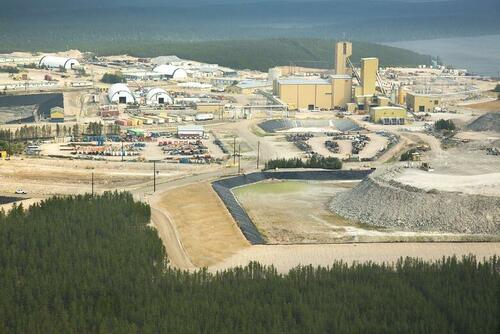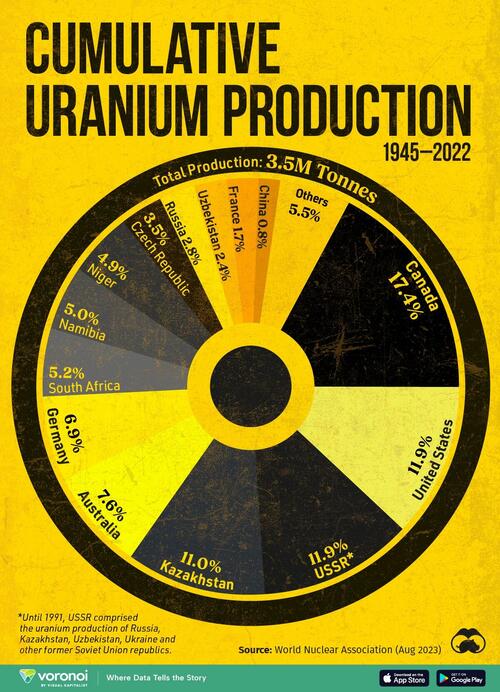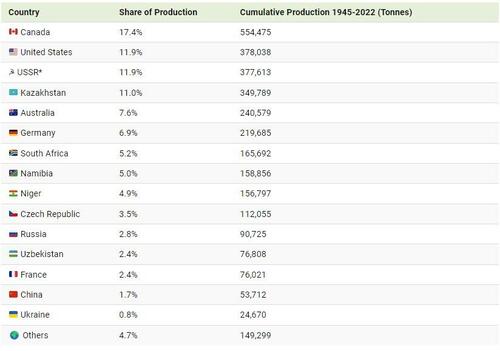
Uranium production in Cigar Lake, Canada is the highest-grade in the world.
Since 2014, the site has mined 105 million pounds of the radioactive metal, which is naturally occurring on Earth.
It is the largest uranium mine on the planet.
For context, an egg-sized amount of uranium fuel can generate as much electric power as 88 tonnes of coal.
Given its vast uranium deposits, Canada has produced the most uranium worldwide since 1945.
This graphic, via Visual Capitalist's Marcus Lu shows cumulative uranium production by country in modern history, with data from the World Nuclear Association.
The Top Uranium-Producing Countries
Since 1945, a total of 3.5 million tonnes of uranium has been produced globally.
Together, Canada and the U.S. account for over 29% of global production, mining 932,000 tonnes over the last several decades.
*Until 1991, USSR comprised the uranium production of Russia, Kazakhstan, Uzbekistan, Ukraine and other former Soviet Union republics.
During the Cold War, the USSR mined over 377,000 tonnes of uranium for a variety of purposes including nuclear reactors and naval fuel.
Due to demand from nuclear reactors, uranium production sharply increased from the 1960s to the 1980s. With this came the construction of the earliest generation of nuclear plants. Today, about 436 nuclear reactors are in operation.
Since the war in Ukraine, uranium has drawn increased attention given its role in nuclear weapons. Ukraine had 15 nuclear reactors depending on uranium from Russia, but the country rapidly signed a deal with Canada due to their exposure to the crisis.
Similar to Ukraine, nuclear reactors in Finland were at risk since their Russian-made reactors relied on the know-how of Russian firms.
While uranium is used for defense purposes, it also plays a key role in electricity generation thanks to its low carbon footprint. In the U.S., about 19% of electricity is powered from nuclear plants, and around 10% of global electricity is from nuclear power sources.
Uranium production in Cigar Lake, Canada is the highest-grade in the world.
Since 2014, the site has mined 105 million pounds of the radioactive metal, which is naturally occurring on Earth.
It is the largest uranium mine on the planet.
For context, an egg-sized amount of uranium fuel can generate as much electric power as 88 tonnes of coal.
Given its vast uranium deposits, Canada has produced the most uranium worldwide since 1945.
This graphic, via Visual Capitalist’s Marcus Lu shows cumulative uranium production by country in modern history, with data from the World Nuclear Association.
The Top Uranium-Producing Countries
Since 1945, a total of 3.5 million tonnes of uranium has been produced globally.
Together, Canada and the U.S. account for over 29% of global production, mining 932,000 tonnes over the last several decades.
*Until 1991, USSR comprised the uranium production of Russia, Kazakhstan, Uzbekistan, Ukraine and other former Soviet Union republics.
During the Cold War, the USSR mined over 377,000 tonnes of uranium for a variety of purposes including nuclear reactors and naval fuel.
Due to demand from nuclear reactors, uranium production sharply increased from the 1960s to the 1980s. With this came the construction of the earliest generation of nuclear plants. Today, about 436 nuclear reactors are in operation.
Since the war in Ukraine, uranium has drawn increased attention given its role in nuclear weapons. Ukraine had 15 nuclear reactors depending on uranium from Russia, but the country rapidly signed a deal with Canada due to their exposure to the crisis.
Similar to Ukraine, nuclear reactors in Finland were at risk since their Russian-made reactors relied on the know-how of Russian firms.
While uranium is used for defense purposes, it also plays a key role in electricity generation thanks to its low carbon footprint. In the U.S., about 19% of electricity is powered from nuclear plants, and around 10% of global electricity is from nuclear power sources.
Loading…







